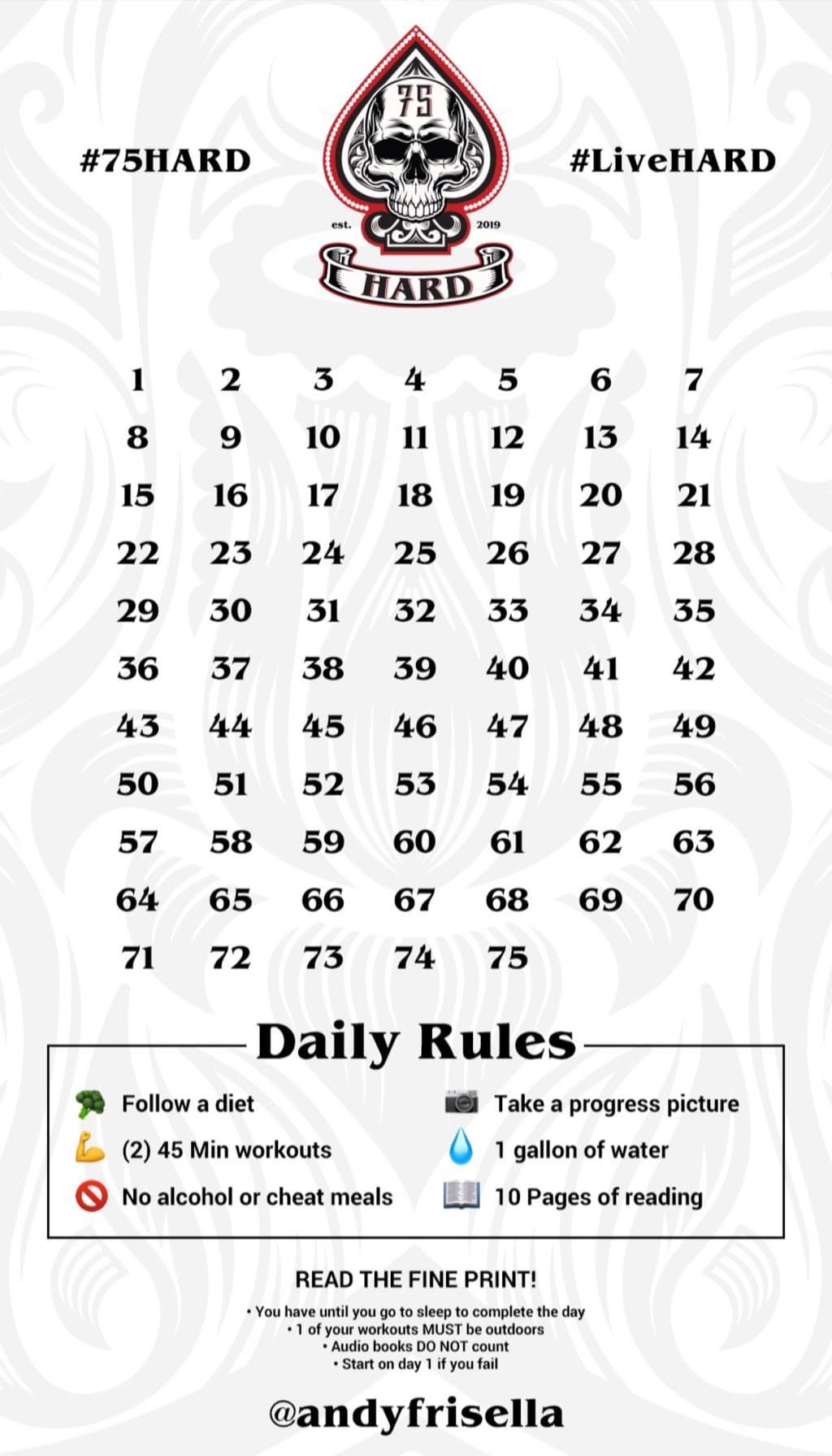Have you heard of the 75Hard Challenge? It’s a mental and physical 75-day challenge designed by Andy Frisella from the Real AF podcast to help you “take complete control of your life.” The main rules are that for 75 days straight, you follow a diet of your choosing, do two daily workouts, take a daily progress photo, drink a gallon of water, and read 10 pages — every single day.
This mental and physical challenge is very intense and well, hard — it might be one of the most difficult things you’ll ever commit to. If you’re into trying fitness or wellness challenges and like pushing yourself out of your comfort zone, you may be excited to try 75Hard. But before you start, check out what the #75Hard challenge entails and see what experts think.
What Is 75Hard?
The 75Hard challenge rules are outlined below. Frisella said there are zero compromises and substitutions, and “you have until you go to sleep to complete the day.” If you “fail” to do any one of these six things on the list, you must start over on Day 1. You can use the chart ahead to check off the days you complete.
75Hard Rules
Frisella explained all the rules in an interview he did on this podcast.
- Follow a diet: The diet can be anything you choose, whether it’s Whole30, vegetarian, plant-based, pescatarian, gluten-free, Paleo, no sugar, low-carb — you choose, but there has to be a physical improvement in mind. This doesn’t necessarily mean weight loss, but the diet change has to make you feel better in some way. Maybe you want to eat less sugar because you know it upsets your stomach. Or maybe you want to go plant-based to lower your cholesterol levels.
- Two 45-minute workouts; one has to be outside: There are no specifics about the workouts, how intense they need to be, or the type. You could do a strength-training workout at the gym, then take a 45-minute walk outside. You can run outside for 45 minutes, then take a yoga class. You can even work out longer than 45 minutes. You choose, but the outdoor workout has to happen, whether it’s raining or -10 degrees out. The point is that you can’t always control the weather, just like you can’t always control things in your life.
- No alcohol, and no “cheat meals:” No cheat meals means you can’t stray from the diet you chose. That means if you say you’re giving up sugar, you can’t have one tiny bite of cake, or else you need to start back on Day 1. The point is to teach you how to stay focused on the goals you set.
- Take a progress picture every day: Looking back at the photos will help you see how far you’ve come and keep you on track if you want to give up.
- Drink one gallon of water: This will teach you that sometimes, the simplest tasks can be the hardest to do.
- Read 10 pages of a book (audiobooks don’t count): This has to be a nonfiction book, so you can learn something and grow your mind.
Frisella explained in this podcast that the point of this challenge is to help you achieve confidence, self-esteem, self-worth, grit, perseverance, and resilience. By pushing yourself to stay committed to these goals, to develop discipline even when it gets hard or uncomfortable, once the 75 days are completed, he believes you will be a different person, “guaranteed.”

What Do Dietitians Think About 75Hard?
Since the first aspect of this challenge involves diet, I wanted to get the opinion of registered dietitian Leslie Langevin, MS, author of The Anti-Inflammatory Kitchen Cookbook. As I suspected, she said, “I think this is an extreme way to develop some better health habits. I think they should be tailored individually and that rules shouldn’t be so clear cut.” Registered dietitian Emily Tills, MS, CDN, agreed and said, “Although the idea is interesting and can seem like it’s flexible because you choose what diet you’re going to do, in the end, it’s still going to be restrictive.”
Since it refers to “no cheat meals,” Langevin thinks this could lead to a diet mentality because of the rigidity and deprivation. She said 75Hard might be designed with good intentions, but she feels it’s overly restrictive. Tills also feels that this type of plan wouldn’t be successful for someone who wanted to lose weight. It would be difficult to sustain this lifestyle after the 75 days are up, and Tills wondered what would happen when the person goes back to their old eating habits.
What Does a Certified Trainer Think About 75Hard?
With the exercise component to 75Hard, I also wanted to get a trainer’s take. ACE-certified trainer Rachel MacPherson agreed with Langevin that this is a pretty extreme challenge. She said two 45-minute workouts a day is a lot for anyone just starting out. Also, not everyone can get outside every day for 45 minutes. Some people live in climates where that just isn’t always doable, especially if you have a full-time job and kids.
“This plan is an example of letting perfection be the enemy of the good. If you fail one small aspect of the plan, you need to start back at ground zero,” MacPherson said, which will make you feel demoralized and defeated. “It’s much better to accept that some days won’t be perfect, but as long as you’re making strides toward your goals, you are on the right track,” she explained. For example, if you hope to work out four days a week but are swamped and only work out three, you have still made progress. Focusing on what you failed at or what you couldn’t accomplish is not the healthiest mindset for most people. MacPherson added that most research shows that taking small, attainable steps toward clearly defined goals is the best way to go.
What Can You Do Instead of 75Hard?
At its core, 75Hard recommends keeping active, sticking to something for the long-term, and not switching diets every few days, as many people do. “There’s a lot to be said for consistency, it just doesn’t have to be so rigid, in my opinion,” MacPherson said.
Langevin agreed and recommended to set a few attainable, sustainable, healthy-minded goals you can work on over a few weeks like these:
- Aim to eat more veggies.
- Drink more water and less soda, sugary coffee beverages, or energy drinks.
- Exercise three times a week.
- Aim to eat a balanced, nutritious diet most of the time but allow yourself treats so you don’t get stuck in diet mentality. Diet mentality means restricting your food, or having certain rules about what you can and can’t eat for weight loss. All foods are allowed, unless you are allergic or they make you feel bad.
- Do something to benefit your mental health every day, even if it’s a one-minute meditation.
